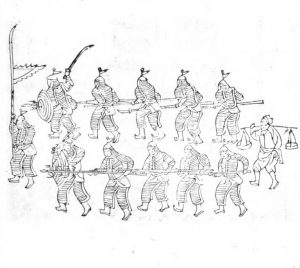Part of the 2018 One Asia Forum Talk Series
with Dr. Masato Hasegawa (Max Planck Institute, Germany)
 Abstract: Drawing on writings of Mao Yuanyi (1594-1641), one of the most prolific writers of the Late Ming period on military matters, this talk explores the relationship between war, mobility, and technology and how the concept of reliability shaped wartime and everyday transport in early seventeenth-century China. A military strategist and advisor, Mao participated in Ming defense efforts against the Jurchen forces in Liaodong in the early seventeenth century. In his voluminous writings on the conduct of war, he extensively discussed the costs and benefits of the transport methods that were available at the time, including boats, carts, pack animals, and human labor. All things considered, Mao clearly favored what he termed “human transport” (renyun), which exclusively relied on the physical labor of human bearers. By analyzing his forceful argument in favor of transport using human labor, this talk demonstrates how consideration over costs and speed became inseparable from the concept of reliability both in the short and long term and across seasons. Closely examining Mao’s writings on military logistics also provides an invaluable lens to understand how wartime and everyday transport intersected in Late Ming society.
Abstract: Drawing on writings of Mao Yuanyi (1594-1641), one of the most prolific writers of the Late Ming period on military matters, this talk explores the relationship between war, mobility, and technology and how the concept of reliability shaped wartime and everyday transport in early seventeenth-century China. A military strategist and advisor, Mao participated in Ming defense efforts against the Jurchen forces in Liaodong in the early seventeenth century. In his voluminous writings on the conduct of war, he extensively discussed the costs and benefits of the transport methods that were available at the time, including boats, carts, pack animals, and human labor. All things considered, Mao clearly favored what he termed “human transport” (renyun), which exclusively relied on the physical labor of human bearers. By analyzing his forceful argument in favor of transport using human labor, this talk demonstrates how consideration over costs and speed became inseparable from the concept of reliability both in the short and long term and across seasons. Closely examining Mao’s writings on military logistics also provides an invaluable lens to understand how wartime and everyday transport intersected in Late Ming society.

About the speaker: Masato Hasegawa received his Ph.D. in History from Yale University in 2013 and is currently a Postdoctoral Fellow at the Max Planck Institute for the History of Science in Berlin. Previously, he taught Chinese, Korean, and East Asian history at the University of Oregon, Columbia University, and New York University. His research focuses on the role of the environment and technology in shaping the mobility of people, animals, and goods in Asian borderlands in the early modern period. His dissertation, “Provisions and Profits in a Wartime Borderland: Supply Lines and Society in the Border Region between China and Korea, 1592-1644,” examined the devastating effects of war mobilization on the society of the Sino-Korean borderland from the late sixteenth to the early seventeenth centuries. He is currently revising his dissertation for book publication and preparing a new project on the concept of reliability in logistics in early modern East Asia.
More info: https://asia.ubc.ca/events/event/one-asia-forum-with-masato-hasegawa/